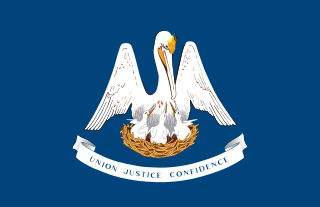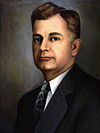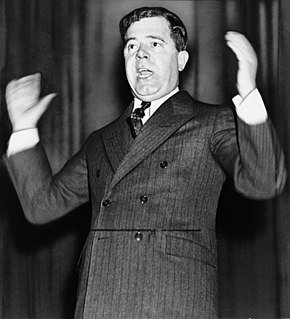
Earl Kemp Long was an American politician and the 45th Governor of Louisiana, serving three nonconsecutive terms. Long, known as "Uncle Earl", connected with voters through his folksy demeanor and colorful oratory. He departed from other southern politicians of his time by promoting a progressive agenda, including expanding school-lunch programs, teacher pay, public-works projects, and minority voting rights.
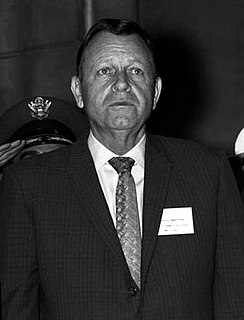
James Houston Davis was an American singer and songwriter of both sacred and popular songs, as well as a politician and former governor of Louisiana. A politician as well as a songwriter, Davis was elected for two nonconsecutive terms from 1944–48 and from 1960–64 as the governor of his native Louisiana. He ran both campaigns as a controversial advocate for impoverished and rural white Louisianians.

Gerald Lyman Kenneth Smith was an American clergyman and far-right political organizer, who became a leader of the Share Our Wealth movement during the Great Depression and later founded the Christian Nationalist Crusade. He founded the America First Party in 1944, for which he was a presidential candidate in the election that year.

Sam Houston Jones was the 46th Governor of Louisiana for the term from 1940 to 1944. He defeated the renowned Earl Kemp Long in the 1940 Democratic runoff primary election. Eight years later, Long then in a reversal of 1940 defeated Jones in the 1948 party primary.
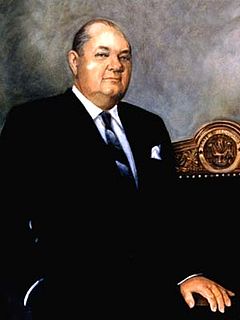
James Albert Noe Sr. of Monroe served for three and a half months as the 43rd Governor of Louisiana after the death of Oscar K. Allen on January 28, 1936.

The Louisiana gubernatorial election of 1944 was held in two rounds on January 18 and February 29, 1944. Like most Southern states between the Reconstruction Era and the Civil Rights Movement, Louisiana's Republican Party was virtually nonexistent in terms of electoral support. This meant that the two Democratic Party primaries held on these dates were the real contest over who would be governor. The 1944 election saw the reformer ‘anti-Long’ faction retain power for another four years under Jimmie Davis.

Robert Sidney Maestri was mayor of New Orleans from 1936 to 1946 and a key ally of Huey P. Long, Jr., and Earl Kemp Long.
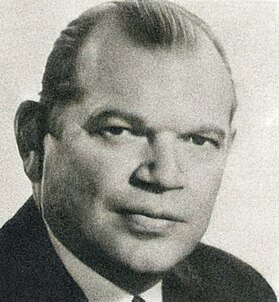
William Joseph "Bill" Dodd held five important positions in Louisiana government in the mid-20th century, including the offices of state representative, lieutenant governor, state auditor, president and member of the State Board of Education, and state education superintendent, but he never achieved his ultimate goal: the state's powerful Napoleonic-style governorship. Twice Dodd failed to win the pivotal Democratic gubernatorial nomination: 1952 and 1959. To his critics, he was a Long "hatchet man". To his admirers, he never let his defeats sour his optimistic spirit, his patriotism, or his devotion to his adopted home state.

The Louisiana gubernatorial election of 1956 was held on January 17, 1956. The 1956 election saw the election of Earl K. Long to his second full term as Governor of Louisiana. He received over 50% of the vote, defeating his opponents so soundly that no runoff vote was needed.

The Louisiana gubernatorial election of 1959–60 was held in two rounds on December 5, 1959, and January 9, 1960. After an election which featured some of the most racially charged campaign rhetoric in Louisiana political history, Jimmie Davis was elected to his second nonconsecutive term as governor after defeating the Republican candidate, Francis Grevemberg, in the general election.

The Politics of Louisiana are known for its entrenched corruption and populism. The State has toggled between Democratic and Republican control since the civil war, and has reliably supported populist candidates of all stripes, including Huey Long, Earl Long, David Duke, and George Wallace. Other distinct features of Louisiana's politics include its calcified aristocracy, use of the Napoleonic Code, history of white supremacy, and the divide between Catholics in the south and Evangelical Protestants in the north.
Wade Omer Martin Jr. was the Democratic Secretary of State of Louisiana under five governors, having served from 1944 to 1976. Though originally part of the Long faction, Martin quarreled with Governor Earl Kemp Long during Long's third term in office, and Long relieved Martin of nearly all of his powers as secretary of state.

Otto Ernest Passman was a conservative Democratic congressman from Monroe in northeastern Louisiana, who served from 1947 to 1977. He is primarily remembered for his detailed knowledge and mostly opposition to foreign aid. He was unseated in the 1976 primary election by the more moderate challenger, Jerry Huckaby of Ringgold, a town in Bienville Parish.

The Louisiana gubernatorial election of 1924 was held in two rounds on January 15 and February 19, 1924. Like most Southern states between the Reconstruction Era and the Civil Rights Movement, Louisiana's Republican Party was virtually nonexistent in terms of electoral support. This meant that the two Democratic Party primaries held on these dates were the real contest over who would be governor. The 1924 election saw Henry L. Fuqua defeat Hewitt Bouanchaud to become Governor of Louisiana, and saw the beginning of the political rise of Huey P. Long, who came in a surprisingly strong third.

The Louisiana gubernatorial election of 1936 was held on January 21, 1936. Like most Southern states between the Reconstruction Era and the Civil Rights Movement, Louisiana's Republican Party was virtually nonexistent in terms of electoral support. This meant that the Democratic Party primary held on this date was the real contest over who would be governor. The election resulted in the victory of Richard W. Leche of New Orleans as governor. Leche was supported by the Longite faction of the party and Cleveland Dear of Alexandria by the anti-Longs' "Home Rule" ticket. State Representative Mason Spencer of Tallulah dropped out of the race and endorsed Dear, but the ballots had already been printed, and he received nearly two thousand votes.

Jesse Homer Bankston Sr. was a politician within the Democratic Party of Louisiana, a businessman, and, at his death at the age of 103, a member of the board of Louisiana Public Broadcasting.

The Louisiana gubernatorial election of 1948 was held in two rounds on January 20 and February 24, 1948. Like most Southern states between the Reconstruction Era and the Civil Rights Movement, Louisiana's Republican Party was virtually nonexistent in terms of electoral support. This meant that the two Democratic Party primaries held on these dates were the real contest over who would be governor. The 1948 election saw the defeat of Louisiana's reformer "anti-Long" faction and the election of Earl Kemp Long to his first full term as governor.
Joseph T. Cawthorn, known as Joe T. Cawthorn, was an attorney, businessman, and a Democratic politician from Mansfield in DeSoto Parish in northwestern Louisiana. He was affiliated with the Long faction of state politics.
Malcolm Emmett Lafargue was a United States Attorney from Shreveport, Louisiana. He was known for his prosecution in 1939 as an Assistant US Attorney of several figures in the corruption scandals known as the "Louisiana Hayride." He achieved several convictions, including of Governor Richard W. Leche, and many of these officials were sentenced to prison. This ushered in a period of political reform in the state.

